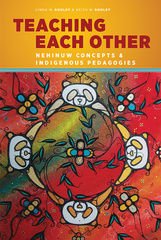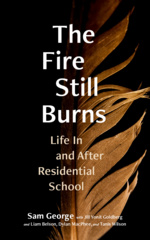
Drumming Our Way Home
Intergenerational Learning, Teaching, and Indigenous Ways of Knowing
What does it mean to be Secwepemc? And how can an autobiographical journey to recover Secwepemc identity inform teaching and learning? Drumming Our Way Home demonstrates how telling, retelling, and re-storying lived experiences not only passes on traditional ways but also opens up a world of culture-based learning.
Georgina Martin was taken from her mother not long after her birth in a segregated tuberculosis hospital. Her experience is representative of the intergenerational trauma inflicted by the Canadian state on Indigenous peoples. Here she tells her story and invites Elder Jean William and youth Colten Wycotte to reflect critically on their own family and community experiences. Together they journey, exchanging thoughts about personal and collective identity, culture and language, and the challenging process of gaining traditional knowledge.
This process of reaching into memories not only uncovers the pain of separation from culture but also provides a powerful example of reconnection through healing, affirmation, and intergenerational learning. Throughout this journey, Georgina Martin is guided by her hand drum, reflecting on its use as a way to uphold community protocols and honour teachings.
Drumming Our Way Home is evidence of the value of storytelling as pedagogy, demonstrating that it can offer vital lessons in teaching, learning, and meaning making.
This significant contribution to Indigenous pedagogical methodology is an excellent resource for educators, education students, and eduational policy makers. It should also be read by scholars and students in Indigenous studies and anthropology. Those in the helping fields of social work and health, education, and sociology will find the narrative of a personal healing journey inspiring and informative.
Through the use of a hand drum that was gifted to her, Martin gives a deeply personal account of how she is reclaiming her First Nation culture and identity…
By expertly weaving her personal and lived experiences with those of an Elder and a youth, Georgina Martin’s book is a step toward our own sense of validation and healing. Especially in light of the Truth and Reconciliation report and the ninety-four Calls to Action, this is critical work.
Georgina Martin’s voice, hand drumming, and ideas about individual and collective cultural identity, intergenerational learning and healing, and reconciliation are vibrant, far-reaching, and need to be shared widely … [Drumming Our Way Home] offers hope and possibility for finding one’s way to a meaningful concept of home and for contributing to concrete actions of reconciliation.
Georgina Martin is a professor in the Department of Indigenous/Xwulmuxw Studies at Vancouver Island University. Prior to her academic career she worked in a range of federal and provincial government departments, serving in roles including Native Program Officer, Community Health Development Officer, Land and Community Coordinator, and Aboriginal Liaison Equity Officer.
Foreword / Jo-ann Archibald
Preface
1 Drumming as Metaphor
2 The Drum Reverberates against the Intergenerational Aspects of Colonialism
3 Honouring the Drummer: Embodied Knowledge from within my community
4 Elder Jean’s Stories: Passing the Drum Forward to the Next Generation
5 Colten’s Stories: Memories and Values
6 Intergenerational Knowledge Transmission
Notes; References; Index










